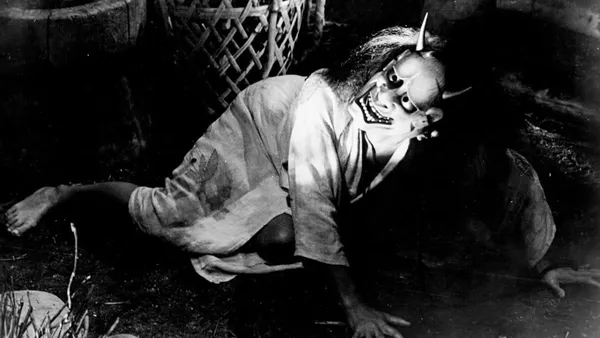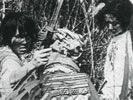Eye For Film >> Movies >> Onibaba (1964) Film Review

A bloody, protracted and pointless quarrel between rival emperors has torn feudal Japan apart. While they await the return of their conscripted husbands, a woman (writer/director Kaneto Shindo's wife, Nobuko Otowa) and her daughter-in-law (Jitsuko Yoshimura) have taken desperate measures to survive, murdering any soldiers who wander into their grass field, dumping their bodies into an ancient hole and exchanging the armour for food with local blackmarketeer Ushi (Taiji Tonoyama). Yet when their unscrupulous neighbour Hachi (Kei Sato) comes home from the battlefield with bad news, his sexual desirability threatens to disrupt the two women's fragile interdependence, leading the older woman to find a special use for a demonic mask that she has stripped from a passing samurai (Jukichi Uno).
As someone who had lived through the Second World War, Shindo had first-hand experience of the horrors of martial conflict, not just for those on the front line, but also for those left at home. Working within his own independent production company, Kindai Eiga Kyokai, formed as a shelter for communist and imperialist filmmakers alike, who had fallen foul of the American occupiers, he first attracted international acclaim with his humanist semi-documentary The Children Of The Atom Bomb (1952), addressing head on the tragedy of Japan's recent wartime experience from a civilian perspective. Yet it was Onibaba (aka Devil Woman, The Demon, The Hole, The Ogress, The Witch), a fictional film made 12 years later, set amidst a medieval civil conflict, and based in part on an ancient Shin Buddhist folktale (The Mask Of Flesh), that would capture the true power of war to corrupt and dehumanise, and would prove to be the greatest success of Shindo's long career.

Director William Friedkin once described Onibaba as "the scariest film I ever saw". Today's viewers, reared since the Seventies on far more bloodcurdling fare (including Friedkin's own The Exorcist) would be unlikely to share this sentiment, but still, even if Onibaba tells the story of a haunting that is entirely faked, the horrors that it contains are real and compelling enough. Shindo depicts a war-ravaged landscape, where the basic need to survive has overridden all morality, and ordinary people unblinkingly enact the most depraved of misdeeds. The deserter Hachi laughs about stabbing a helpless man in the back and even boasts of murdering a priest for his clothes, while the two women are so inured to robbing and killing as a means of putting millet on the table that the older one can declare without any intended irony, "We've done nothing wrong." She may argue with her daughter-in-law about whether there really is a hell awaiting sinners, but the two already live in a hell on earth, where human beings can be every bit as monstrous as the masks behind which they hide.
There is no mistaking the film's anti-war message, but peer a little closer through the tall susuki grasses, in which the three main characters darkly conduct their business and pleasure, and you may also notice an altogether different kind of allegory. The vast, gaping pit at the centre of the story, fed by the strong and devouring the weak, serves as a metaphor for the insatiable hunger that drives capitalism. Shindo, a committed communist, vividly depicts a world where everything is for sale, but nothing has any value, a microcosm of dog-eat-dog consumerism whose murderous, corpse-robbing inhabitants are only one step away from cannibalism, or vampirism. So the horror of war and the horror of untrammeled market forces combine in a nightmarish vision of humanity bestialised.
Beautifully shot in black-and-white by cinematographer Kiyomi Kuroda, with an unforgettable setting in a sea of swaying grass and a memorable soundtrack by Hikaru Hayashi, consisting of saxophones (to echo the sound of wind through reeds), primitivist drums, raucous tubas and ritualistic voices, Onibaba is a stark portrayal of lust, jealousy and raw hunger.
Thanks to this first-time UK release on DVD, and in an exquisitely restored print, Shindo's finest film has not been allowed to disappear down a hole.
Reviewed on: 11 Sep 2005


















